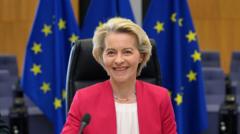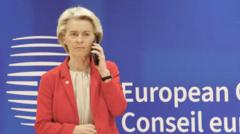The ruling signifies a step towards better transparency in the European Union regarding public health communications.
**EU Court Ruling Enhances Transparency on Vaccine Deal Texts**

**EU Court Ruling Enhances Transparency on Vaccine Deal Texts**
European Commission ordered to disclose text messages between Ursula von der Leyen and Pfizer’s CEO.
In a landmark ruling that advocates for transparency within the European Union, the court has mandated the release of text messages exchanged between Ursula von der Leyen, the European Commission president, and Albert Bourla, the chief executive of Pfizer, during their negotiations for Covid-19 vaccine contracts. This decision, made by the General Court of the European Union on Wednesday, seeks to clarify how public interest documents should be disclosed under European Union law.
This case arose after The New York Times submitted a request for the release of these messages, which the European Commission initially denied, claiming that such casual communications were “short-lived” and not subject to disclosure. However, the judges challenged this perspective, stating that the commission must provide credible reasons as to why these messages could not be produced.
The court emphasized that the commission’s claims regarding the significance of the texts were unfounded, asserting the importance of transparency in the procurement process during a global pandemic. This decision potentially sets a precedent for improved accountability and accessibility to government communications in the European Union, especially concerning public health matters. As the pandemic has underscored the significance of clear governmental communication, this ruling could foster future transparency in negotiations that affect public health across Europe.
This case arose after The New York Times submitted a request for the release of these messages, which the European Commission initially denied, claiming that such casual communications were “short-lived” and not subject to disclosure. However, the judges challenged this perspective, stating that the commission must provide credible reasons as to why these messages could not be produced.
The court emphasized that the commission’s claims regarding the significance of the texts were unfounded, asserting the importance of transparency in the procurement process during a global pandemic. This decision potentially sets a precedent for improved accountability and accessibility to government communications in the European Union, especially concerning public health matters. As the pandemic has underscored the significance of clear governmental communication, this ruling could foster future transparency in negotiations that affect public health across Europe.





















